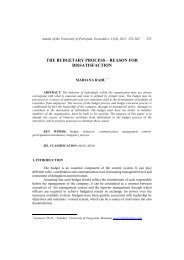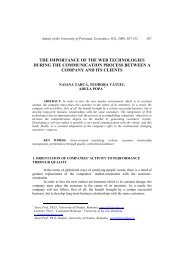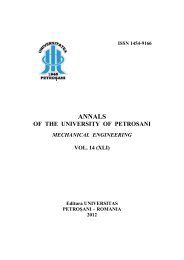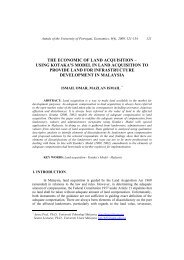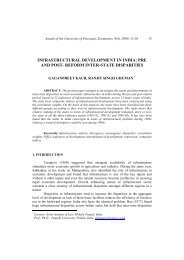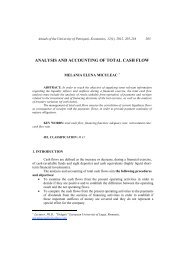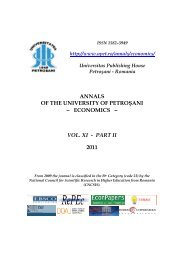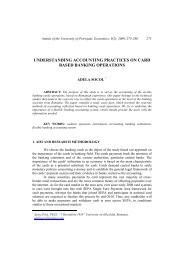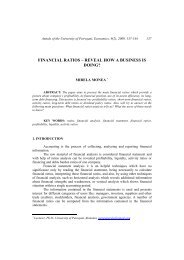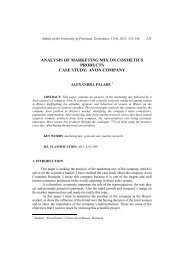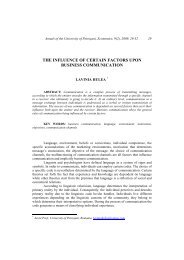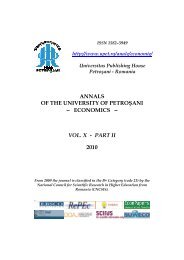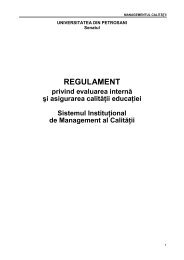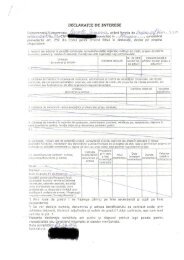annals of the university of petroÅani â¼ economics â¼ vol. xi - part i ...
annals of the university of petroÅani â¼ economics â¼ vol. xi - part i ...
annals of the university of petroÅani â¼ economics â¼ vol. xi - part i ...
You also want an ePaper? Increase the reach of your titles
YUMPU automatically turns print PDFs into web optimized ePapers that Google loves.
Guiding Marks Regarding <strong>the</strong> Reasoning <strong>of</strong> Scientific Research in … 53<br />
at studying <strong>the</strong> laws that govern facts and which can be used to develop scientific<br />
previsions (Raboaca & Ciucur, 1999). Knowledge about a certain area <strong>of</strong> reality is<br />
crystallized into a science only when it is integrated in a <strong>the</strong>ory on <strong>the</strong> basis <strong>of</strong><br />
principles and laws.<br />
Regardless <strong>of</strong> its complicated (Einstein) or simple (Kotarbinski) definitions,<br />
science is revealing its content if we assert that it represents a set <strong>of</strong> information that is<br />
systematized and verified/validated by practice, a knowledge based on real facts that<br />
explain and resolve practical problems, but a knowledge that can be empirically<br />
(experimentally) verified and confirmed, because science deals with studying <strong>the</strong> laws<br />
that govern reality and which can be used to develop scientific previsions (Andone, et.<br />
al., 2011).<br />
During <strong>the</strong> accounting research process, <strong>the</strong> e<strong>xi</strong>stence <strong>of</strong> a <strong>the</strong>ory (on <strong>the</strong> basis<br />
<strong>of</strong> which a hypo<strong>the</strong>sis is identified, which will subsequently be tested or recommended<br />
as <strong>the</strong> foundation <strong>of</strong> a model resulted from observing <strong>the</strong> real world) is crucial. With<br />
<strong>the</strong> help <strong>of</strong> <strong>the</strong> <strong>the</strong>ory, we try to organize and explore certain issues e<strong>xi</strong>sting in a<br />
knowledge field.<br />
The following <strong>the</strong>ories have been outlined in accounting:<br />
- Normative <strong>the</strong>ories provide explanations about “how” to build <strong>the</strong> representation<br />
<strong>of</strong> an “accounting reality” (Ionascu, 1997). They are ra<strong>the</strong>r predicative than<br />
descriptive and are based on deduction; <strong>the</strong> normative research may also be used to<br />
detect <strong>the</strong> endangered accounting concept and treatments or to influence <strong>the</strong> future<br />
accounting regulation by making decisions to maintain, redefine or abandon an<br />
accounting principle, an accounting treatment or an accounting concept.<br />
- Accounting positivism – implies that any <strong>the</strong>oretical formulation can’t be valid<br />
unless it is empirically verified, aims to explain and forecast accounting behaviour<br />
and deals with accounting sociology;<br />
- Constructivist <strong>the</strong>ories – according to which accounting is a social “construct”,<br />
developed according to certain norms and values internalised by <strong>the</strong> accountant or<br />
researcher. The focus is on language, interpretation and understanding human<br />
action. This research also includes subjects ignored by positivists (to role <strong>of</strong><br />
women in accounting) or less approached issues (<strong>the</strong> social implications <strong>of</strong><br />
accounting systems). Accounting constructivism places a great deal <strong>of</strong> importance<br />
on political and social aspects, integrating ideologies in research.<br />
There are researchers who support <strong>the</strong> <strong>the</strong>ory titled “grounded <strong>the</strong>ory” or “field<br />
<strong>the</strong>ory” (Andone, et. al., 2011), a derivate <strong>of</strong> <strong>the</strong> study <strong>of</strong> <strong>the</strong> phenomena <strong>the</strong>y<br />
represent. The starting point <strong>of</strong> this <strong>the</strong>ory is <strong>the</strong> relevant phenomena from which is<br />
developed a <strong>the</strong>ory that can explain <strong>the</strong>m on <strong>the</strong> basis <strong>of</strong> <strong>the</strong> observations resulted from<br />
research.<br />
Ano<strong>the</strong>r <strong>the</strong>ory, titled decision <strong>the</strong>ory, demonstrates <strong>the</strong> concept <strong>of</strong> financial<br />
statement. In accounting, in order to conduct a viable study, researchers use concepts<br />
from economy, finance, financial markets, etc. Accounting researchers should focus on<br />
<strong>the</strong> decision <strong>the</strong>ory, as it is enunciated by o<strong>the</strong>r sciences (starting with management<br />
science), to work in a pertinent manner with <strong>the</strong>ories relative to decision,<br />
communication, economy and philosophy <strong>of</strong> <strong>the</strong> entrepreneur.



